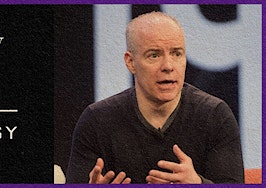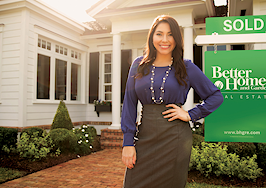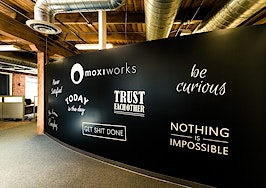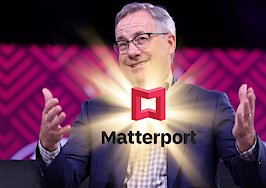Kick off fall with Branding and Marketing month at Inman. We’re going deep on agent branding and best practices for spending with Zillow, realtor.com and more. Top marketing executives drop by to share their newest tactics, too. It’s all you need to take your branding and marketing game to the next level.
While many chief marketing officers only have to worry about one brand, Jennifer Marchetti has two prominent, but very different, brands under her charge: Better Homes and Gardens Real Estate and ERA Real Estate.
Marchetti joined Cendant Corp., Realogy’s predecessor, as a director of marketing and business development in October 2001. When Cendant spun off into Realogy and Wyndham Worldwide, she joined the latter. In November 2010, she became CMO for BHGRE. Nearly nine years later, when Realogy launched its Realogy Expansion Brands division, she became the division’s CMO, adding ERA to her plate.
In a phone interview, Inman caught up with Marchetti to ask what it’s like juggling two brands, what she does as a CMO all day, and how her job is similar to that of a fortune teller.
This interview has been edited for length and clarity.
Inman: In 2019, there was a change: Realogy Expansion Brands was created and you became CMO not just for Better Homes and Gardens, but also for ERA.
Marchetti: Yes. In the fall of 2019 there was a really clear picture that emerged, which is these two brands: Better Homes and Gardens Real Estate, which had a different history, was the younger brand, was the result of a 100-year licensing agreement with Meredith Corporation, and ERA, a really experienced iconic real estate brand of the past few decades, where one really important shared characteristic was they had so much exciting, and continue to have so much exciting, growth potential.
So Realogy said, “Let’s have some shared leadership at the CEO, CMO, COO level and then let’s make sure we have individual brand teams under that where necessary and important and, where possible, also have best-practice sharing of the things that are not above-the-line competitive.”
Basically, each brand benefits from this knowledge and this idea of what will it take to really impact exciting profitable strategic growth, but they have such different go-to-market strategies, they have such different, equally-compelling cultures. What I love about our two brands is it’s like a marketer’s dream because they’re so different. There’s never a day where one could get confused or tripped up in the marketing strategy because their strengths are so distinct.
Is there a reason these two particular brands were chosen? Realogy has several other brands under its umbrella.
They had this tremendous expansion up-side. When you’re nurturing and growing brands that have almost exponential growth opportunity in terms of new territories, like new places to plant flags geographically, it’s a different strategy than if you have an iconic, longer-tenured brand that may have already an impressive and expansive footprint. These brands had more areas to conquer.
As an example, on the ERA Real Estate side, we have a very flexible branding approach. You could be a classic brand, you could be ERA Wilder Real Estate or you could be Powered.
Better Homes and Gardens Real Estate, it is the lifestyle brand of real estate and obviously with everything going on with the pandemic, we as humans have been spending so much more time at home. We’ve been looking at our homes differently. We’ve been appreciating and prioritizing different things about our home. We’ve built a Better Homes and Gardens Real Estate brand on how do you stay relevant and impactful to the consumer before, during and after the real estate transaction.
It’s so fun as a marketer to be able to work on both.
You were CMO for Better Homes and Gardens Real Estate and then in 2019 you became CMO for both of the brands. How did your job change when that happened?
I now have two brands to help grow and to serve, but the beauty of it is because they’re so different there’s never been a moment where it’s been any sort of an issue. In fact, it’s been a great benefit because it really helps you take a really strategic and thoughtful look at your work for each brand, and make sure that you’re doing things that are truly, truly unique.
It’s easy to have your head down and sort of be living in your world. It’s really important to lift your head up and say, “Am I doing things that are truly different? Do I have something that truly stands apart?”
What do you do all day?
Every day is really different, which I think is part of why I felt so intellectually-stimulated and also kind of emotionally-stimulated here. As CMO, no matter who you are — Dunkin’ Donuts, a fashion company, real estate franchising — your job, fundamentally, is to serve and protect a bit.
You have to make sure you’re protecting and preserving and evolving the brand that you are the guardian of, that you are helping to form throughout its lifecycle. You have to believe in your brand and want to protect it. You also serve, and in franchising, it is all about your stakeholders.
When you are in a franchise organization, yes, you want to make sure you are bringing value to consumers. But you better be sure you’re bringing value to the people who are investing in your brand and who are relying on it and in many ways to help build their financial future.
I spend a lot of time getting feedback from people: brokers, agents, understanding what’s missing in our offering, understanding how we can make it easier to use, understanding how we can present them with tools that are able to evolve with them as the industry changes under them and around them. We do a lot of listening.
The other part of being a CMO is it’s almost like a carnival trick — you know when people pretend that they’re a fortune teller or a mind reader but all they’re really doing is reading the cues. That’s what CMOs do. We make it look like we’re predicting the future and knowing things before consumers or others say they want it, but really it’s just using really good data. We use a lot of insights, both quantitative and qualitative, focus groups. We talk to our brokers and agents all the time. You’re able to pull out, not only what do people need today but what’s next, where is it going.
How has the pandemic changed your work?
It’s changed quite a bit. We’re all adapting. I think the most important change that it’s made is this necessity-the-mother-of-invention-type idea. I’ve become a different leader. It’s easier to form relationships with people when you see them every day.
So you have to be more thoughtful and conscientious and deliberate about taking the time to build relationships. With COVID, you could either let it paralyze you or let it stifle how you work or you could take this challenge right by the throat and say, “OK, how can I be better at everything?” So using technology, texting, teams, picking up the phone the old-fashioned way. You build relationships with your team and your clients that way, but it’s deliberate. It takes work, but it pays dividends.
Have you thought about what your top priorities are for 2022?
We’re starting our planning now. Our multi-channel approach for both brands has worked really, really well and will continue to work really well. We are strong in both brands on social and digital. We’re doing new and exciting programs that merge the two. I’m one of those CMOs who believes very deeply in direct marketing and relationship marketing though, because I feel like people are craving not just a digital ad that follows them around the web, but having real high-touch marketing. Both brands are well-positioned for that infrastructure-wise and resource-wise, so that will not change.
We are doing a lot of feedback sessions with brokers and agents because we’re planning technology and product roadmaps and also just marketing campaign offerings that are based on the feedback we’re getting from brokers and agents. Philanthropy and giving back will continue to be a strong pillar of both brand strategies.
We will continue to double down on helping our brokers with talent attraction and recruiting through marketing. We’re launching a lot of social media campaigns. We’ve created awesome resources for them to tell the brand story or to help them tell their company’s story.
You’ve got to build a strategy that can be multi-year. You can always evolve it. But if you’re going from here to there and back again like you’re watching a ping pong tournament, your brand is not going to get traction. I’m lucky, though, because my brands came to me fundamentally well-developed. I didn’t have to artificially create something in a lab. To make the brand resonate, all I did was capture and package and distribute their essence.
Is there anything you wish that people knew about being a CMO that they don’t really realize?
In the end, your marketing has to work. It has to be usable, either by the consumer who’s consuming it or your brokers and agents in our case as well.
And you don’t know everything, no matter how talented you are, no matter how many years you’ve done this, no matter how good you are at your job. You cannot be an effective CMO if you don’t listen. And I mean listen to your team, listen to your executives, listen to your stakeholders, listen to the people who don’t work with you so your competitors, people who said no, maybe, to joining your brand. You’ve got to listen. You can never stop asking questions because it’s so easy, especially if you’ve been doing a job for a number of years, to go into this autopilot mode. And you have to almost audit your own strategy. It’s painful, and it does take some time, but it’s so, so, so important.
I think sometimes marketers separate themselves from the day-to-day business of their stakeholders. But when you talk to a broker or an agent who says, “I don’t want to log into multiple systems to create a postcard or social post or whatever. I just want to log into one system,” you better take that seriously. We tend to create things that are lead by the way marketing works. But marketing is a service to your clients so you need to create marketing in the way that your clients work.
Is there anything else you’d like to add?
It might be tempting to look around all the time at your competitors and either be too focused on what they’re doing or what you’re not doing or vice versa. But fundamentally, to be successful, your job as a CMO is to hold a really clean mirror up to who your brand is and bring the best of that into the market. Stop worrying about what everyone else is doing and focus on who your brand is and why it’s different. Be authentic. Don’t try to emulate what other people are doing because in the end, consumers are too smart for that, and certainly in real estate, brokers and agents are too smart for that. Don’t fall into that trap.
That point of difference doesn’t have to be earth shattering, never before seen. It could just be something that you as a brand never forgot to do that everyone else forgot when they were chasing other points of differentiation.
Volvo loves to talk about safety. There’s no car brand in the world who would be like, “Oh we’re unsafe.” Volvo focused on something that maybe wasn’t as sexy as what Audi and Mercedes and everyone [were doing], but it matters. So, again, your point of difference doesn’t have to be what no one else has, but it should be what maybe no one else is focused on.













